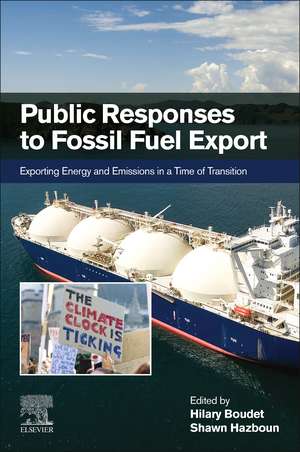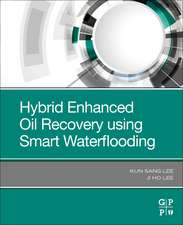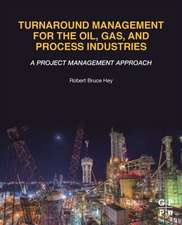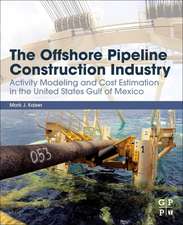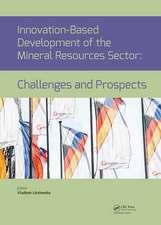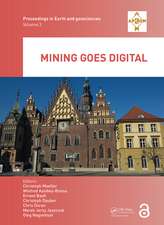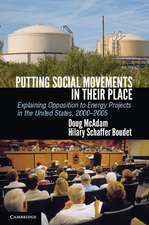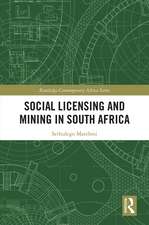Public Responses to Fossil Fuel Export: Exporting Energy and Emissions in a Time of Transition
Editat de Hilary Boudet, Shawn Hazbounen Limba Engleză Paperback – 21 feb 2022
What do members of the public think about exporting fossil fuels in places where it is happening? What do they see as its main risks and benefits? What connections are being made to climate change and the impending energy transition?
How have affected communities responded to proposals related to fossil fuel export, broadly defined to include transport by rail, pipeline, and ship? Contributions to the work are presented in three parts. The first part synopsizes the background of the project, outlines major social science theories and relevant previous research, and identifies global trends in energy production. Regional and national case studies related to public opinion on fossil fuel export are included in part two of the manuscript. Part three highlights community-based case studies. Implications for research and practice feature in the concluding chapter.
- Serves as a definitive reference on the social dimensions of fossil fuel export, bringing together case examples and public opinion research from around the world on this important but understudied issue
- Explores the broader implications for growing field of energy social science, particularly those focused on public perceptions of energy development, siting controversies and community impacts from energy development
- Provides practical and policy implications, including the need for better community inclusion in export and transport facility siting decisions, the changing status of certain fuels, impacts on public awareness, and the relevance of the movement of energy resources
Preț: 560.11 lei
Preț vechi: 733.14 lei
-24% Nou
Puncte Express: 840
Preț estimativ în valută:
107.21€ • 116.49$ • 90.12£
107.21€ • 116.49$ • 90.12£
Carte tipărită la comandă
Livrare economică 12-26 aprilie
Preluare comenzi: 021 569.72.76
Specificații
ISBN-13: 9780128240465
ISBN-10: 0128240466
Pagini: 294
Dimensiuni: 152 x 229 mm
Greutate: 0.4 kg
Editura: ELSEVIER SCIENCE
ISBN-10: 0128240466
Pagini: 294
Dimensiuni: 152 x 229 mm
Greutate: 0.4 kg
Editura: ELSEVIER SCIENCE
Public țintă
Early career researchers, students, and practitioners within the public, private and NGO sectors interested in fossil fuel export, energy transitions and public participation/community impacts from energy development. Readers will come from a wide array of social science disciplines and fields, although it would be accessible for interested engineers and natural scientists as well.Cuprins
PART I Introduction
1. An introduction to the social dimensions of fossil fuel export in an era of energy transition 3
PART II The new landscape of fossil fuel technology,supply, and policy
2. The new global energy order: shifting players, policies, and power dynamics
3. Fossil fuel export as a climate policy problem
PART III Public opinion on export
4. The evolution of US public attitudes toward natural gas export: a pooled cross-sectional analysis of time series data (2013-2017)
5. Drivers of US regulatory preferences for natural gas export
6. Energy and export transitions: from oil exports to renewable energy goals in Aotearoa New Zealand
7. Trends in Norwegian views on oil and gas export
8. A “thin green line of resistance? Assessing public views on oil, natural gas, and coal export in the Pacific Northwest region of the United States and Canada
PART IV Community response to export projects
9. Global discourses, national priorities, and community experiences of participation in the energy infrastructure projects in northern Russia
10. Indigenous ambivalence? It’s not about the pipeline...:Indigenous responses to fossil fuel export projects in Western Canada
11. The primacy of place: a community’s response to a proposed liquefied natural gas export facility
12. Impact geographies of gas terminal development in thenorthern Australian context: insights from Gladstone and Darwin
13. Community risk or resilience? Perceptions and responses to oil train traffic in four US rail communities
14. Leave it in the ground, or send it abroad? Assessing themes in community response to coal export proposals using topic modeling of local news
PART V The future of fossil fuel export in an era of energy transition
15. Social dimensions of fossil fuel export: summary of learnings and implications for research and practice
1. An introduction to the social dimensions of fossil fuel export in an era of energy transition 3
PART II The new landscape of fossil fuel technology,supply, and policy
2. The new global energy order: shifting players, policies, and power dynamics
3. Fossil fuel export as a climate policy problem
PART III Public opinion on export
4. The evolution of US public attitudes toward natural gas export: a pooled cross-sectional analysis of time series data (2013-2017)
5. Drivers of US regulatory preferences for natural gas export
6. Energy and export transitions: from oil exports to renewable energy goals in Aotearoa New Zealand
7. Trends in Norwegian views on oil and gas export
8. A “thin green line of resistance? Assessing public views on oil, natural gas, and coal export in the Pacific Northwest region of the United States and Canada
PART IV Community response to export projects
9. Global discourses, national priorities, and community experiences of participation in the energy infrastructure projects in northern Russia
10. Indigenous ambivalence? It’s not about the pipeline...:Indigenous responses to fossil fuel export projects in Western Canada
11. The primacy of place: a community’s response to a proposed liquefied natural gas export facility
12. Impact geographies of gas terminal development in thenorthern Australian context: insights from Gladstone and Darwin
13. Community risk or resilience? Perceptions and responses to oil train traffic in four US rail communities
14. Leave it in the ground, or send it abroad? Assessing themes in community response to coal export proposals using topic modeling of local news
PART V The future of fossil fuel export in an era of energy transition
15. Social dimensions of fossil fuel export: summary of learnings and implications for research and practice
